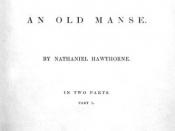"What is your Birth Sin?' 'Adams sin imputed to me, and a corrupt nature dwelling in me." A Puritan is a member of English Protestants who advocated strict religious discipline. Nathaniel Hawthorne's story, "Young Goodman Brown," is meant as a critique to the ideals of Puritan faith. Goodman Brown personifies many of the puritan characteristics, which include fear and strict faith. Puritan dogma teaches that humans are absolutely corrupt and require endless self-scrutiny to understand that they are sinners and undeserving of God's Grace. This is due to the fact that the covenant made between God and man was destroyed when Adam ate from the Tree of Knowledge. In the Puritan creed, believers devotedly acknowledged the negative characteristics of their humanity more readily than the gifts they possessed. Moreover, the Puritan faith also confused the aspect of sin in the outside world. The environment was continuously tempting man to allow its wickedness to flourish within.
Therefore the world contains wickedness and it is mans duty to rid the world of this wickedness. To be sinful can only be defined as the tendency to live outside of ones nature. Narcissism for example is a form of evil; it is against ones nature to only be concerned with ones self. Wickedness can also be in the form of inertia described as the predisposition to stay fixed and to not grow as a person. Edmund Burke interpreted inertia as, "The only thing necessary for the triumph of evil is for good men to do nothing." To do nothing against injustices in the world is man's greatest evil. Therefore being that evil is depicted as living outside of ones nature, evil is a trait, which can only dwell within man. Nathaniel Hawthorne uses many symbols to represent Puritan belief and the mistakes...


